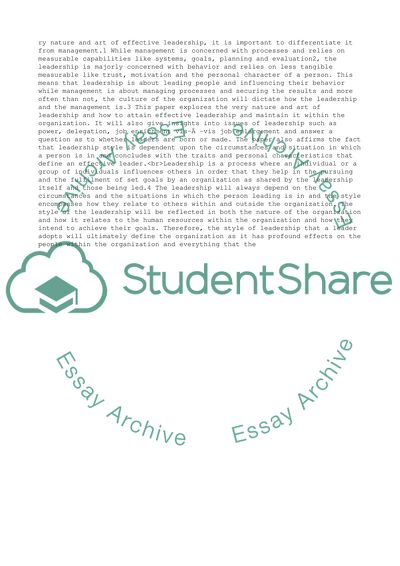Cite this document
(“The nature and art of effective leadership. Here, I want you to Essay”, n.d.)
The nature and art of effective leadership. Here, I want you to Essay. Retrieved from https://studentshare.org/management/1630272-the-nature-and-art-of-effective-leadership-here-i-want-you-to-explore-issues-of-power-delegation-job-enrichment-versus-job-enlargement-are-leaders-born-or-made-leadership-style-will-be-dependent-upon-the-circumstances-and-situation-in-which-you-are
The nature and art of effective leadership. Here, I want you to Essay. Retrieved from https://studentshare.org/management/1630272-the-nature-and-art-of-effective-leadership-here-i-want-you-to-explore-issues-of-power-delegation-job-enrichment-versus-job-enlargement-are-leaders-born-or-made-leadership-style-will-be-dependent-upon-the-circumstances-and-situation-in-which-you-are
(The Nature and Art of Effective Leadership. Here, I Want You to Essay)
The Nature and Art of Effective Leadership. Here, I Want You to Essay. https://studentshare.org/management/1630272-the-nature-and-art-of-effective-leadership-here-i-want-you-to-explore-issues-of-power-delegation-job-enrichment-versus-job-enlargement-are-leaders-born-or-made-leadership-style-will-be-dependent-upon-the-circumstances-and-situation-in-which-you-are.
The Nature and Art of Effective Leadership. Here, I Want You to Essay. https://studentshare.org/management/1630272-the-nature-and-art-of-effective-leadership-here-i-want-you-to-explore-issues-of-power-delegation-job-enrichment-versus-job-enlargement-are-leaders-born-or-made-leadership-style-will-be-dependent-upon-the-circumstances-and-situation-in-which-you-are.
“The Nature and Art of Effective Leadership. Here, I Want You to Essay”, n.d. https://studentshare.org/management/1630272-the-nature-and-art-of-effective-leadership-here-i-want-you-to-explore-issues-of-power-delegation-job-enrichment-versus-job-enlargement-are-leaders-born-or-made-leadership-style-will-be-dependent-upon-the-circumstances-and-situation-in-which-you-are.


